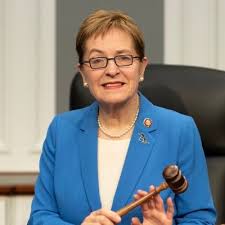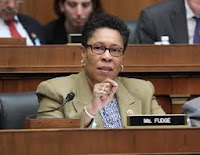
 Pictured are Ohio Democratic Congresspersons Marcy Kaptur (wearing teal suit) (D-9) and Marcia L. Fudge (wearing tan brown suit ) (D-11)
Pictured are Ohio Democratic Congresspersons Marcy Kaptur (wearing teal suit) (D-9) and Marcia L. Fudge (wearing tan brown suit ) (D-11)
CLEVELANDURBANNEWS.COM, WASHINGTON, D.C.-Ohio Congresswoman Marcy Kaptur (D-OH), a Toledo Democrat whose ninth congressional district extends from Toledo to Cleveland and the longest serving woman in Congress, recently testified before the House Committee on Administration’s Subcommittee on Elections during a congressional hearing titled "The Impact of COVID-19 on Voting Rights and Election Administration: Ensuring Safe and Fair Elections."
The hearing comes less than five months before the November presidential election and was chaired by subcommittee on elections chairwoman 11th Congressional District Congresswoman Marcia L. Fudge, a former chair of the Congressional Black Caucus and a Warrensville Heights Democrat whose largely Black congressional district includes Cleveland and several of its eastern suburbs of Cuyahoga County.
It was one of several elections hearings chaired by Fudge since she was officially appointed to chair the subcommittee on elections by Democratic House Speaker Nancy Pelosi, a previously defunct elections subcommittee resurrected by Pelosi when she became Speaker after the Democrats, via the November 2018 midterm elections, regained control of the House from the Republicans, who still control the U.S. Senate.
It functions primarily to handle matters relating to voting rights issues.
Also participating, among others, was subcommittee on elections member Rep. Rodney Davis, a Republican out of Illinois, who, along with Fudge, is one of four members of Congress on the elections subcommittee.
The other two subcommittee members, neither of whom attended the hearing, are Democratic Rep. G.K. Butterfield of North Carolina, who is also a former chair of the CBC like Fudge, and Rep Pete Aguilar, a California Democrat.
COVID-19 has inflicted chaos on the country's election system and voters have been forced to endure hours long lines as polling locations close, social distancing measures are put in place, and effective mail-in voting remains elusive.
"Around the country, from Ohio to Georgia to Wisconsin, COVID-19 has inflicted chaos on our election system," Rep. Kaptur said in a press release as to her congressional testimony on the voting rights issue.
Her press release goes on to say that "in many cases, minority communities have been disproportionately affected and the consequences of COVID-19 on our electoral process are made worse by voter suppression and disenfranchisement techniques."
The elections hearing, which took place virtually, can be viewed here .
Rep. Kaptur’s statement at the congressional hearing on elections in its entirety is as follows:
Thank you, Chairwoman Fudge and ranking member Davis, for the opportunity to address your subcommittee. You have taken a leadership role amidst the COVID-19 epidemic, including your efforts to author in the HEROES Act key provisions to streamline election administration. Your subcommittee also conducted a dynamic and thought-provoking oversight hearing in Cleveland last year, in which I had the pleasure of participating. Thank you for your strong continuing leadership.
Our vote is our voice in our republic. Voting is a right, not a privilege. The women’s suffrage, civil rights, and LGBTQ movements have made our democratic republic advance closer to our Constitution’s aspirations. Unfortunately, at this time of economic and social reckoning and much uncertainty, our franchise is in danger.
President Trump and his allies are trying to undermine confidence in absentee voting, and by association, our electoral system. Now let me be clear, theirs is a transparent attempt to use every conceivable play to delegitimize elections and distort their result.
We must rise above their partisan antics to ensure every American has equal access to the ballot and that those ballots are able to be filed and counted with high precision.
The timing of Ohio’s 2020 primary election placed Ohio’s election in suspended animation. Our March 17th primary election was just days after President Trump declared a national emergency on March 13, 2020. As the scale of the epidemic became apparent, Ohio Governor Mike DeWine acted to postpone in person voting. Unfortunately, this set off a chaotic series of events jeopardizing our fundamental right, the franchise. Voter turnout plummeted. Absentee ballots and early voting results were held in abeyance.
The legal process to change and ultimately cancel in person voting was rife with disorder. Chaos ensued as litigation stretched into the night. Voters and poll workers did not know whether the polls would be open or closed when they woke on primary election day.
Eventually, the primary was rescheduled to April 28, 2020, with nearly 2 million voters requesting absentee ballots in a very confusing “mail in – mail back” process. Unfortunately, despite an unprecedented surge in the number of requests, data compiled by Five Thirty-Eight indicates voter turnout on the April 28, 2020 primary reached just over 20% -- well below the historic average for a Presidential year, for example in 2016 the Primary turnout of voters was 43.66%.
This was likely due to the additional steps required to request a ballot, ballots arriving too late, delays in postal service processing that prevented timely delivery of ballots, and vast numbers of in-person provisional ballots being rejected out of hand. The cumbersome absentee ballot request process, and the failure to automatically send ballots to people with prepaid return postage meant fewer voters and less participation.
This is disenfranchisement, plain and simple.
In addition to this flood of logistical challenges, Ohio is under water as a result of the increased costs. With unnecessarily restrictive voting laws, and Republican one-party rule in a resistant legislature, Ohio is ensnared in the vice of laws purposefully designed to make voting more restrictive.
For example, the Ohio legislature is debating HB 680 which would roll back in-person early voting, and end statewide mailing of ballot applications for November election. This will suppress the vote, and that is its intent.
A recent study by the Brennen Center (who you will hear from in the next panel) estimates Ohio and its localities would now bear as much as $82 million in unplanned election costs before November.
The CARES Act allocated $400 million for elections grants to the states, $12.8 million to Ohio. Unfortunately, these funds are inadequate for what is required as state and local governments brace for major budget cuts.
Mitch McConnell’s Senate majority must get the HEROES ACT over the legislative finish line, with its $3.6 billion for State and Local governments for election assistance. Otherwise jurisdictions will have to cut major corners that will place the franchise at even greater risk.
I applaud the United States Commission on Civil Rights, a bipartisan and congressionally chartered organization for initiating a fact-finding mission to ensure the fall election is conducted with rigor.
The challenge is great. But Congress has the tools to prevent a repeat of Ohio’s primary election chaos and disastrous turnout. We must meet this real challenge to democracy. The question is: do those in charge have the will? With tens of millions of newly unemployed, and with more people taking to the streets—too many Americans believe their voice is suppressed in this one-party rule state.
We therefore have an even greater obligation to use every tool in our arsenal to administer a universal, accessible, free, safe and fair fall election.
Thank you, Chairwoman Fudge and Ranking Member Davis, for holding this critical hearing. All we as for in Ohio is a fair fight, but not one that is jimmy-rigged by one party rule in Ohio.
Clevelandurbannews.com and Kathywraycolemanonlinenewsblog.com, the most read Black digital newspaper in Ohio and in the Midwest. Tel: (216) 659-0473. Email: editor@clevelandurbannews.com. We interviewed former president Barack Obama one-on-one when he was campaigning for president. As to the Obama interview. CLICK HERE TO READ THE ENTIRE ARTICLE AT CLEVELAND URBAN NEWS.COM, OHIO'S LEADER IN BLACK DIGITAL NEWS.








